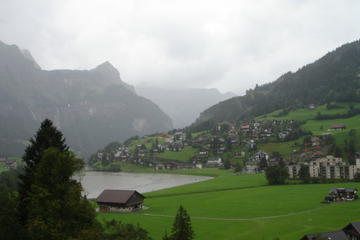Engelberg
TIME : 2016/2/22 15:07:09

Engelberg
Engelberg, literally meaning the Mountain of Angels, is a mountain valley and village in central Switzerland boasting one of the best action packed recreational programs in the country. The fun doesn’t stop at skiing and snowboarding and from paragliding and bungee jumping to climbing, snow tubing and zorbing, the adventure possibilities are pretty much endless. A bit more traditional is the village’s history. Engelberg was founded in 1120 by Benedictine monks and to this day, one of the defining characteristics of the landscape is the Benedictine monastery, an imposing baroque building originating in the 18th century. About 30 monks still live and work there, and among other tasks, they lead a local boarding school. Just like the monastery, Engelberg has managed to retain its traditional Swiss character and despite some chalets and resorts popping up, is mostly still inhabited by locals. Thus, the village doesn’t turn into a ghost town as soon as the ski season is over.
Engelberg’s slogan “welcome to heaven” is fitting and cable cars and chair lifts lead to 82 kilometers of slopes in one of the best ski areas in Switzerland, including the longest ski run in the alps, which is 12 kilometers long. Accessible via the world’s first rotating cable car is the summit of Mount Titlis at over 3,000 meters, where the Ice Flyer, a glacial cave and incredible views over the snowy Alps await. In summer, green alpine meadows and steel-blue mountain lakes beg to be discovered by hiking through a network of trails covering over 360 kilometers.
Practical Info
Engelberg can be reached from Lucerne in just 45 minutes. Out of convenience, many people take the direct train, but if you plan to arrive by car, you will find big parking lots adjoining the cable car station. The village is small and can be explored by foot, but there are also busses operating and ferrying people between the train station and the cable cars.
